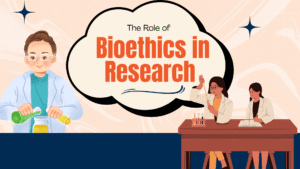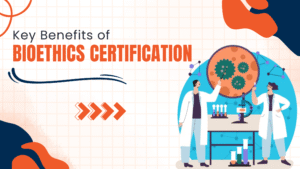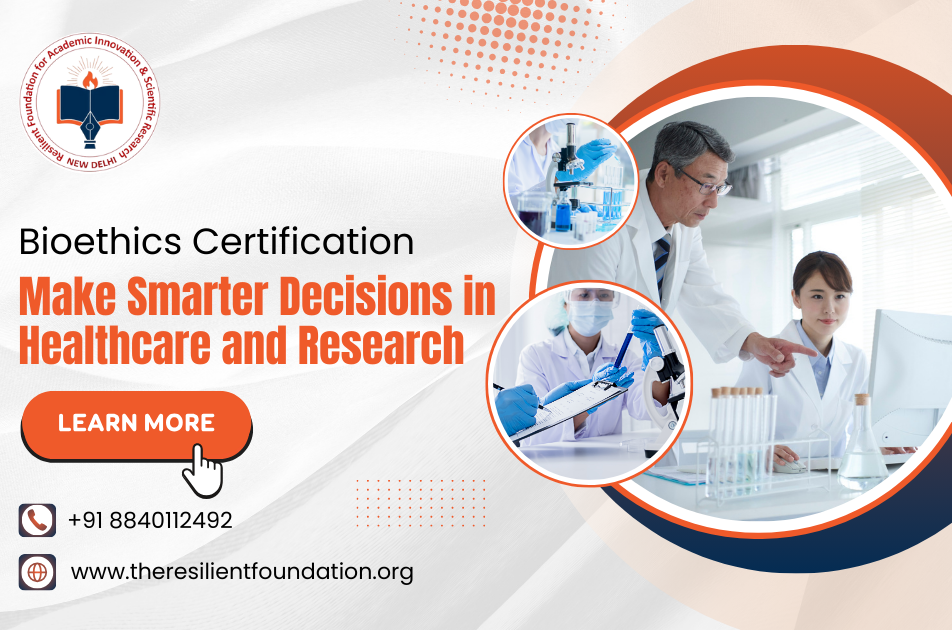Healthcare and science are evolving rapidly, but decisions are not always straightforward. Doctors, researchers, and policymakers face difficult choices every day. This is where bioethics certification becomes valuable. It helps professionals think deeply about challenging questions, make informed judgments, and balance technology and human values. Whether it is a new treatment, a clinical trial, or the use of AI in healthcare, the right training creates confidence to act responsibly. At the Resilient Foundation, the focus is on building skills through ethical learning, enabling healthcare and biomedical science to serve people in the best way possible.
Why Bioethics Matters in Healthcare?
Ethics is not just about rules, but also about protecting patients and ensuring trust. When people understand the principles, they make better care decisions. A bioethics certification helps medical teams guide their actions with honesty and responsibility.
Here are a few reasons why ethics truly matter:
- Respect for patients: Every individual must be treated with dignity, even if choices are difficult.
- Clarity in treatment options: Doctors can explain risks and benefits honestly to families.
- Trust builds stronger care: Patients believe in the system when they see fairness.
- Technology requires balance: The arrival of AI in healthcare has raised new moral questions.
- Guidance for professionals: Knowledge of ethics helps doctors, nurses, and health managers think carefully before making life-changing decisions.
This is why training matters. At Resilient Foundation, the research ethics certification ensures healthcare teams are updated with knowledge that blends science and compassion.
The Role of Bioethics in Research

Research is the backbone of medical progress, but it comes with responsibility. A bioethics training program helps researchers act fairly, even under pressure. The role of ethics goes far beyond following basic rules, because it protects both participants and outcomes.
Key points are:
- Protecting participants: Volunteers in a study must be safe at all times.
- Informed consent: People should always know what they are agreeing to.
- Trust in findings: If research is honest, people can depend on the results.
- Handling new technologies: As AI in healthcare grows, scientists must keep human rights at the centre.
- Global collaboration: Ethical guidelines allow international projects in biomedical science to move forward smoothly.
At Resilient Foundation, each research ethics certification emphasises these values so that progress is never made at the cost of humanity.
Key Benefits of Bioethics Certification

Choosing a bioethics certification is not just about getting a certificate; it is about building a mindset. Students, professionals, and researchers all gain practical benefits by enrolling in a bioethics training program. Some of those benefits are:
- Smarter decision-making: Professionals can act with confidence during critical situations.
- Career advancement: Employers trust people who understand and apply ethics in practice.
- Better understanding of technology: Modern tools like AI in healthcare bring risks, but training teaches safe use.
- Impactful research outcomes: With a strong ethical base, results are credible and usable.
- Broader knowledge: From daily hospital care to biomedical science, learners apply ethics everywhere.
- Global recognition: International institutions prefer candidates with research ethics certification, which makes opportunities larger.
At Resilient Foundation, courses are designed to provide all these advantages in a structured and practical way.
Expert Opinion
Ethics is not optional; it is the compass of healthcare and research. A bioethics training program ensures that science, biomedical science, and AI in healthcare grow with fairness and humanity. – Resilient Foundation Mentor.
Future of Bioethics in Healthcare and Research
The demand for professionals with a bioethics certification will increase because technology is changing faster than ever before. The future of healthcare will face more questions than answers. That is why Resilient Foundation is committed to preparing leaders through its specialised programs.
Here are some clear future directions:
- Personalised medicine: Patients may receive unique treatments, but ethics will guide fair access.
- AI in healthcare: Smart machines will support doctors, but decisions must stay human-centred.
- Data privacy: With more digital records, protecting patient rights will be critical.
- Stronger regulations: Countries will need experts with research ethics certification to create safer laws.
- Growth of biomedical science: From organ transplants to genetic research, training will ensure innovation remains ethical.
- Global standards: The Resilient Foundation will play a leading role by shaping programs that bring ethics and progress together.
Because of that, investing in a bioethics training program today means securing a responsible tomorrow. Moreover, it ensures that humans remain at the heart of every medical and research breakthrough.

